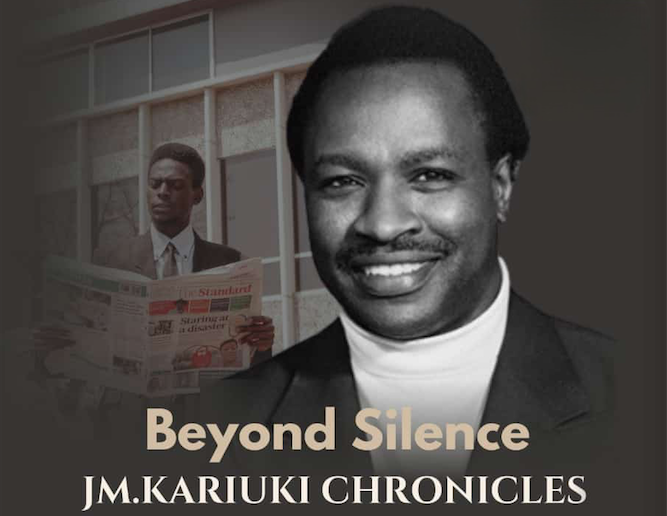
ART CHECK: Theatre ideology in Prof Obura’s life
Tribute revisits shift from acting to academia
It fills information gap but misses opportunity to dissect liberator’s milestones
In Summary

Audio By Vocalize

Play: Beyond Silence: JM Chronicles
Performed by: Chisaina Arts Play
Dates: October 13, 2024: The National Theatre;
April 20, 2025: Jalaram Auditorium, Westlands
The staging of the play ‘Beyond Silence: JM Chronicles’ is a milestone. The fact that we can finally interrogate the history of this enigmatic man in Kenyan history is an achievement in itself in an era where stories of resistance to a creeping dictatorship are being suppressed, as seen with the Butere Girls play and the GenZ revolt.
It is commendable that new and varied theatre spaces have opened up in Nairobi besides the usual outlets — Kenyatta National Theatre, Alliance Francaise, Goethe Institute and Ukumbi Mdogo.
In recent times, the Oshwal Auditorium and the Jalaram Auditorium have become venues in interrogating the contested histories of Tom Mboya and now JM Kariuki.
I commend both these communities for opening their spaces to hosting the Kenyan voice to tell our histories in search of answers to our hidden and suppressed stories of freedom and liberation.
The Tom Mboya play by Too Early for Birds has been performed to critical acclaim over the last two years at the Oshwal Auditorium, and for that I say, “Hongera”.
And now the Jalaram auditorium has given voice, through Chisaina Arts, to the life of patriot JM Kariuki, a politician who was loved and maligned in equal measure and was assassinated 50 years ago on March 2, 1975.
The JM family have enthusiastically supported
this production and are still seeking proper closure to the death of their
family patriarch.
The task now is for Too Early for Birds and Chisaina Arts to take the plays to the counties where there is real hunger for new and creative theatrical works. We are in the 15th year of devolution, and this expansion of our creative voices is long overdue.
ROAD TO DISILLUSION
Chisaina Arts did a commendable job in telling the story of JM Kariuki, who famously said, “We do not want a Kenya of ten millionaires and ten million beggars.” On March 2, 1975, JM’s remains were found in Ngong Forest by a herd boy. His hands had been chopped off, his eyes gorged out, his face burnt with acid and left on an ant's nest. As of 2025, his murder remains unsolved.
It is a Herculean task to tell the story of JM in two hours. Chisaina Arts, through director Victor Muyekwe, made a valiant attempt in painting broad strokes through history and enacting the three main trajectories of JM’s history.
These are his Mau Mau phase, his dalliance with the Kenyatta regime when he became a millionaire through state largesse and opportunity, and finally his disillusionment with the neocolonial state as he realises the betrayal of the aspirations of the Kenyan people for land and freedom, resulting in his assassination.
The story of JM needs to be told in much greater detail through the different phases of his life since each weaves an intriguing mosaic in history. The performance started and ended with the voices of GenZ, who represent the new generation that demands a return to the ideals of a free, democratic, just and accountable Kenya.
Recently, on the 50th anniversary of JM’s death, Nation Media Group and the Department of History at the University of Nairobi both interacted with the history of this remarkable man in history.
John Kamau wrote in the Nation on March 5 about JM’s links with Apartheid Israel. JM helped set up the National Youth Service in the vein of Israel’s Nahal experiment, which integrated military discipline with national development, and procured 45 scholarships to train Kenya's future intelligence officers and pilots in Israel.
“The Israelis, eager to cultivate strong ties with the emerging Kenyan state, saw in him a willing and capable partner, one who could navigate the complex interplay between former Mau Mau combatants and the newly forming government,” Kamau wrote.
He added that JM was “not only a man of means but also a power man draped in wealth and influence, with a rich portfolio spanning lucrative casino directorships, high-stakes gemstone trading and vast agricultural ventures”.
The Department of History and Archaeology hosted a lecture in JM’s honour at University of Nairobi Towers, Chandaria Hall, on March 27. It was titled: ‘JM Kariuki’s Political History: His Legacy in Kenya’s Future’. The lecture was delivered by Kamoji Wachira, who knew JM personally.
CHILLING LAST HOURS
The play enacted in chilling fashion the last hours of JM as he interacted with different state actors, culminating in his shocking assassination and the consequent discovery of his body in a mortuary, labelled “unknown adult male”.
Kenya lost another son of the soil who refused to betray the ideals of ‘land and freedom’, which the Mau Mau had taken up arms for.
Not to take away from the positives of the production, I personally felt that there was too much stage time devoted to dealing with JM’s family life and the alleged salacious side of his character. This could have been used more productively in telling his story as Jomo Kenyatta’s personal secretary, his business acumen, the Israeli connection, the relationships and tensions within the new emerging political and security elite of Kenyan society, and the after-death solidarity campaigns by the student community in Kenya.
I feel it is premature for Chisaina Arts Play to move onto other productions as it announced at the end of the play. Much more introspection is needed to make it not only a better production but also fill the unfulfilled gap for Kenyan audiences who are just beginning to hear of the play.
The theatre group also needs to explore other more affordable and accessible venues that can reach diverse audiences.
Reviewed by Zahid Rajan

Tribute revisits shift from acting to academia